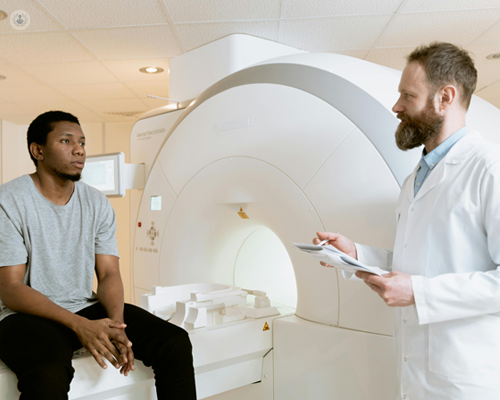CT coronary angiography: How is it performed and what does it detect?
Escrito por:A CT coronary angiography is a test that analyses the heart and the coronary arteries surrounding the heart to identify if there are any blockages or any other heart-related problems that need to be treated.
Expert consultant cardiologist Dr Aftab Gill explains in detail what exactly a CT coronary angiography is, how it's performed and what it detects.

What is CT coronary angiography?
It's a relatively new way of looking at the arteries around your heart. So, looking at the blood vessels around your heart to see if there's any narrowing or blockages which can lead to problems such as angina, or increased risk of you having a heart attack.
How is CT coronary angiography performed?
It's essentially a CT scan that involves putting you through, in essence, a large doughnut-shaped machine. A drip is put in the back of your hand to give you dye that allows for contrast, and this dye is injected into your vein. That then travels around your heart, as well, and the CT scan takes pictures of the blood vessels around your heart to pick up any evidence of any narrowing, blockages or any calcium which may cause problems.
How accurate is a CT coronary angiography test?
This test is extremely accurate and has been tested, and compared to invasive coronary angiograms. In other words, the angiograms where tubes were put into blood vessels and then taken up to the heart, it's been shown to be essentially as accurate as those. As long as the heart rate is appropriately controlled.
What can results indicate?
The results of a CT coronary angiography will tell us if there's any narrowing in the arteries around your heart, and any blockages which may be causing you any problems or any issues which may increase the risk of you having a heart attack.
Depending on results, what is usually the next course of action?
It depends very much on what we find. If they're all clear, then it's very reassuring that any problems or symptoms you may be getting, we can say aren't due to any narrowing in the arteries around your heart.
If there is narrowing, this could result in symptoms of angina, so, some people with chest pain, or get very short of breath.
Doing more tests
If that's the case, we'd need to do some more tests. Now, these may include doing an invasive coronary angiogram, in other words a tube is put into a blood vessel in the artery and it's taken up to the heart. This gives you a much more accurate assessment of this narrowing, and then tells us if the patient needs any treatment, i.e.; do they need a stent to be put in, or in the worst case scenario, there's so much narrowing you need a bypass operation.
There are other tests that we can do to get a better idea, if narrowing that's picked up on the CT is significant. There are various types of stress tests that we can do to stress the heart, to tell us if this narrowing potentially will cause problems to the heart or limit the blood flow to the heart.
If you're concerned about your heart health and are considering undergoing a CT coronary angiography, you can consult with Dr Gill via his Top Doctors profile.


